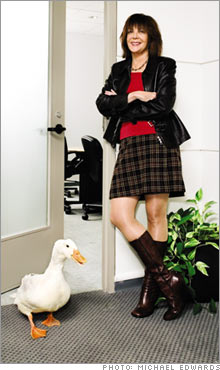How to advertise in 2007Fortune interviews Linda Kaplan Thaler, CEO and Chief Creative Officer of Kaplan Thaler Group.(Fortune Magazine) -- Your new book, "The Power of Nice," talks about using niceness as a business tool. Is that really a trend? People are fed up with greed and opportunism. Look at Enron, Hewlett-Packard (Charts) and most recently Home Depot's (Charts) CEO. In the past, it hasn't been profitable to be nice. But the times are achanging. But I think the Internet is a very big part of it. You can't un-Google yourself. Gone are the days when snappy campaigns could mask bad behavior.
How would you rebrand the U.S.? When you think of the U.S. as a brand, Bush would be our celebrity spokesperson. If he's not popular, then America's greatest asset would be Americans. In particular, it's people in business. They are our ambassadors around the world. Every positive interaction [they have] is a vote in favor of supporting our country. You've worked on political campaign ads in the past. What will we see in the run-up to 2008? I believe candidates will be less concerned with generic "feel good" ads (which will be easily "TiVo'd" out by bored viewers) and instead create targeted messages that are demographic-specific. What will they look like? Education-related ads will run on Lifetime or Oxygen, and youth-oriented messages will go on YouTube or MTV. But they'll all have to ante up the "E" factor: We have become an entertainment-centric society, where the path of least resistance is the one that amuses or startles us most. Why is a duck able to sell insurance? The Aflac duck is a microcosm of how we feel in society. No one seems to notice us. We need to be heard. _____________________ Gallery: What 10 top leaders and thinkers see on their horizon |
Sponsors
| ||||||||||||

